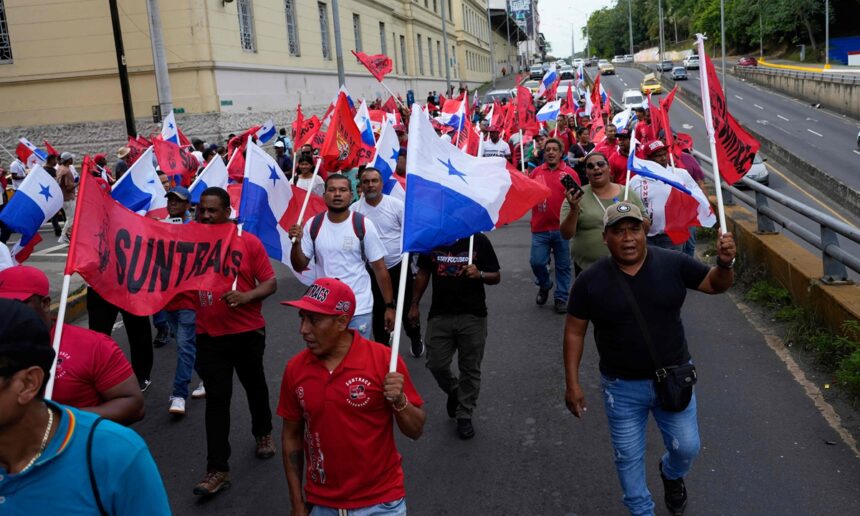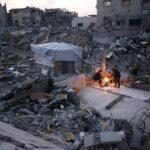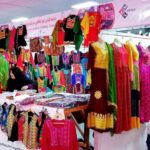Editor’s Note:
The US’ repeated threats to take over the Panama Canal have raised eyebrows among international observers. Meanwhile, the wounds of Panamanians regarding the US invasion of their country have been reopened. The US invasion of Panama, dubbed “Operation Just Cause” by Washington, began on December 20, 1989 and continued into January 1990. The invasion resulted in an undetermined number of casualties and significant political fallout. In her I-Talk show, Global Times (GT) reporter Wang Wenwen talked to Gilma Gloria Camargo (Camargo), a Panamanian lawyer representing the victims of the US military invasion of Panama since 1990, about the painful memories of the invasion and what sovereignty means for Panama today.
GT: Can you tell me how you fought for this case?
Camargo: The case was filed on behalf of the civilian victims of the invasions before the Inter-American Commission of Human Rights of the Organization of American States. It was the only place that we could take a case without the assistance of a government in the conditions of military occupation that we were experiencing at that moment.
I came back to Panama with a delegation of attorneys from different places of the US. We decided that the case needed to be a collective one, representing all the people that we could not reach.
The case was presented in 1990, even though the US had a lot of objections to it. And in 2018, after 28 years of litigation, the result was that the US was deemed responsible for the violations of human rights, and for the victims of the invasions who have suffered a certain type of damages. Those who were not named in the case were also beneficiaries of the decision, because the US had extraterritorial control of Panama during the invasion, and therefore is responsible for every violation that happened there.
What the US fears the most is the information contained in the report. The final report says that they are responsible for the damages they cause, even in armed conflict situations. And extraterritorial violations of human rights also count as violations of human rights. It’s one of the longest cases before the Commission on Human Rights, and one of the largest in terms of numbers. We are seeking for the US to pay damages for the invasion and to compensate the victims for all these 35 years of negligence.
GT: Given that the US has invaded Panama and several other countries, what is your opinion on its self-proclaimed image as a defender of human rights?
Camargo: They have a great propaganda machine. They have consistent and permanent psychological operations. They entered countries like Panama, and they know the population well. They know the political actors, the leadership and the communities. They manage that in the way that makes it impossible or very difficult for people who have a different opinion to be able to work within these systems.
GT: How does the bitter memory of the US’ invasion of Panama in 1989 affect people today?
Camargo: The US took several actions immediately following the military action. They maintained a campaign which claimed the invasion was a “liberation” and people who were in the refugee centers and the general population were forced to say that it was a “liberation.”
Every year, marches and activities were held during the anniversary of the invasion. Three years ago, we managed to get Panama’s national assembly to name December 20 a day of national mourning, to recognize that an invasion happened.
People are still asking for recognition that the largest and most challenging military action in Panama’s history was this invasion. It was brutal. It attacked mainly women, children and older people. We, along with other organizations and social movements, ensure that neither the US government nor the Panamanian government forgets this. Despite any differences we may have, we demand respect for that day.
GT: What do you think of recent remarks of US “taking back” the Panama Canal? What is your understanding of such remarks? And how do you define sovereignty?
Camargo: The Panama Canal is a strategic point for Latin America and for the US, which they want to control from here so that they can reach South America.
There’s no such thing as the resale of the canal to the US. What we are seeing is an intimidation tactic suggesting that “we can invade you again.” The mentality of the people has shifted since 1989; although this intimidation does not work, it is a concern. There is a greater sense of pride among the people of Panama, and we are determined not to allow this to happen.
I have a very clear sense of what sovereignty means and how much you have to fight for it. We know that people need to develop their own resources and maintain control over their powers as a nation. If not, you would not be a nation. You cannot claim to have a little bit of sovereignty, or that you don’t have enough. It’s a continuous, permanent struggle to obtain and to maintain it. The struggles of Panama have primarily been fought by the working-class people. We know that a lot of people are either paid or convinced that the best way to run their country and their lives is to concede everything to the US, believing that if they are good and quiet, the US will be good to them. That’s not true. When you talk about an invasion, the collective memory is that we don’t want that for anybody.
GT: As Panama comes to the media spotlight, some US politicians and media outlets have begun to hype China’s influence on the Panama Canal. Does such hype affect how Panamanians view Chinese investment there?
Camargo: What they’re saying is that the canal is in the hands of the Chinese, because of the investment that the Chinese have in the area. They are trying to sell the view that China is a danger to the canal and to the people of Panama. But the only one who actually had a military presence in the canal zone area and the only one who had achieved the closing of the canal is the US. The Chinese are not seen as a threat to the Panamanians. We have lived with them for too long.
The argument among Panamanians is, if we have sovereignty, we can make our own decisions, and we can get rid of whatever we don’t want. When it comes to the canal, that’s something that is so much part of the fabric of the Panamanian people. Anything that you say negative about the canal prompts us to defend it. We are growing into making decisions and learning how to collectively determine our destiny.













